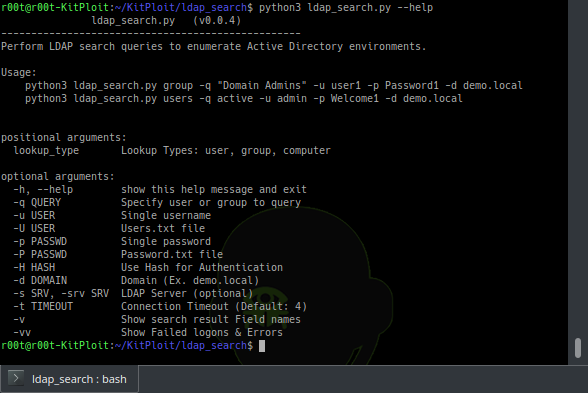LDAP_Search can be used to enumerate Users, Groups, and Computers on a Windows Domain. Authentication can be performed using traditional username and password, or NTLM hash. In addition, this tool has been modified to allow brute force/password-spraying via LDAP. Ldap_Search makes use of Impackets python36 branch to perform the main operations. (These are the guys that did the real heavy lifting and deserve the credit!)
Installation
git clone --recursive https://github.com/m8r0wn/ldap_search
cd ldap_search
sudo chmod +x setup.sh
sudo ./setup.shUsage
Enumerate all active users on a domain:
python3 ldap_search.py users -u user1 -p Password1 -d demo.localpython3 ldap_search.py users -q AdminUser -u user1 -p Password1 -d demo.localpython3 ldap_search.py computers -u user1 -p Password1 -d demo.localpython3 ldap_search.py computers -q eol -u user1 -p Password1 -d demo.local -s DC01.demo.localpython3 ldap_search.py groups -u user1 -p Password1 -d demo.local -s 192.168.1.1python3 ldap_search.py groups -q "Domain Admins" -u user1 -p Password1 -d demo.localQueries
Below are the query options that can be specified using the "-q" argument:
User
active / [None] - All active users (Default)
all - All users, even disabled
[specific account or email] - lookup user, ex. "m8r0wn"
group
[None] - All domain groups
[Specific group name] - lookup group members, ex. "Domain Admins"
computer
[None] - All Domain Computers
eol - look for all end of life systems on domainOptions
positional arguments:
lookup_type Lookup Types: user, group, computer
optional arguments:
-q QUERY Specify user or group to query or use eol.
-u USER Single username
-U USER Users.txt file
-p PASSWD Single password
-P PASSWD Password.txt file
-H HASH Use Hash for Authentication
-d DOMAIN Domain (Ex. demo.local)
-s SRV, -srv SRV LDAP Server (optional)
-t TIMEOUT Connection Timeout (Default: 4)
-v Show Search Result Attribute Names
-vv Show Failed Logins & Errors